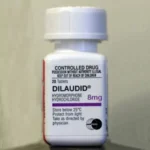









Dilaudid is a medication of hydromorphone. Hydromorphone is a potent opioid analgesic, which means it is a strong pain-relieving medication. It is prescribed by healthcare professionals to manage moderate to severe pain, particularly when other less potent pain medications have proven inadequate. Buy Dilaudid Online works by binding to specific receptors in the central nervous system, altering the perception of pain and providing relief. It is available in various forms, including oral tablets, liquid solution, and injectable formulations, allowing for flexibility in pain management.
$30.00 Original price was: $30.00.$17.50Current price is: $17.50.
Payment Methods:
Dilaudid is a medication of hydromorphone. Hydromorphone is a potent opioid analgesic, which means it is a strong pain-relieving medication. It is prescribed by healthcare professionals to manage moderate to severe pain, particularly when other less potent pain medications have proven inadequate. Dilaudid works by binding to specific receptors in the central nervous system, altering the perception of pain and providing relief. It is available in various forms, including oral tablets, liquid solution, and injectable formulations, allowing for flexibility in pain management.
Due to its potency, Dilaudid is typically reserved for specific situations, such as post-operative pain, severe injury, and pain associated with certain medical conditions like cancer. However, it carries a high risk of dependence and potential side effects, including respiratory depression, sedation, and constipation. As such, it is prescribed with caution and under strict supervision, and the dosage is carefully monitored to balance pain relief with minimizing potential risks.
Dilaudid is indeed a reliable companion. We provide access to this remarkable medication at discounted prices, delivered conveniently to your doorstep. Our unwavering commitment to your well-being drives us to offer you a seamless online purchasing experience.
When you choose to buy Dilaudid from our website, you gain access to a swift overnight delivery service, ensuring that you can find the relief you need precisely when you need it most. We understand that managing pain is a crucial aspect of your health, and our goal is to make that process as efficient and accessible as possible.
Rest assured that with our service, you not only access quality medication but also benefit from the convenience of prompt delivery. Your well-being is our top priority, and we are here to support you on your journey towards pain relief with Dilaudid.
Dilaudid operates by binding to specific opioid receptors in the brain and spinal cord. These receptors are a part of the body’s natural pain management system. When activated by hydromorphone, they lead to a cascade of events that ultimately result in reduced pain perception. This action of Dilaudid makes it a valuable tool in situations where other, less potent pain medications may prove ineffective.
Due to its significant potency and the potential for misuse or abuse, Dilaudid is distributed exclusively through a controlled program known as the Narcotic Analgesic Program. This program places a strong emphasis on the responsible use of the medication, prioritizing patient safety and preventing illicit diversion.
Healthcare providers who prescribe Dilaudid do so with careful consideration of the patient’s pain management needs, as well as a thorough evaluation of their medical history and risk factors. This process helps ensure that Dilaudid is administered to individuals who genuinely require its potent pain-relieving effects.
The use of Dilaudid is always a careful balancing act between providing much-needed pain relief and mitigating the risks associated with opioid medications. Opioids like hydromorphone have the potential for side effects, including drowsiness, constipation, nausea, and, more critically, respiratory depression, which can be life-threatening in high doses or when misused.
Patients prescribed Dilaudid are closely monitored by healthcare professionals to adjust the dosage and treatment plan as needed, aiming to strike the right balance between pain control and minimizing side effects. Frequent follow-up appointments and open communication between patients and healthcare providers are integral to ensuring safe and effective pain management.
Patients receiving Dilaudid are educated about the importance of responsible use. They are provided with clear instructions on how to take the medication, including dosing schedules and potential side effects. Additionally, patients are informed about the risks of opioid dependence and addiction, and the need to store the medication securely to prevent unauthorized access.
Dilaudid is a potent medication that can slow or even stop your breathing, especially when initiating treatment or adjusting your dosage. It is crucial to adhere to your healthcare advisor’s prescribed dose and duration strictly. Avoid self-medication or exceeding recommended dosages, as this can lead to addiction or overdose.
Dilaudid has the potential for habit formation, even when taken as directed. It is imperative never to share this medication with others, as misuse of narcotic pain medication can result in addiction and overdose.
If you are pregnant and facing the need for pain management that involves medications like Dilaudid, it is essential to inform your healthcare advisor. The use of Dilaudid during pregnancy carries potential risks, especially for the developing fetus and the newborn.
The foremost concern is the risk of neonatal withdrawal symptoms, which can be life-threatening for the newborn. When a pregnant individual uses Dilaudid, the baby can become dependent on the medication in the womb. This dependence can result in withdrawal symptoms shortly after birth, posing serious health risks.
Open and honest communication with your healthcare provider is vital during pregnancy. They can explore alternative pain management options that carry fewer risks for both you and your baby. By working closely with your healthcare team, you can ensure that your pain is effectively managed while safeguarding the well-being of your newborn, prioritizing their healthy start in life.
It is critically important to exercise caution and restraint when using Dilaudid. Combining Dilaudid with alcohol can lead to extremely dangerous side effects. Both substances depress the central nervous system, and when used together, they can potentiate each other’s effects, leading to severe respiratory depression, extreme drowsiness, impaired coordination, and a heightened risk of overdose.
To ensure your safety and well-being, it is strongly advisable to abstain from alcohol consumption entirely while taking Dilaudid. Prioritizing your health and following your healthcare provider’s guidance is paramount when managing pain with this potent medication.
Before starting any medication, it’s crucial to be aware of your medical history and any preexisting conditions that may interact with the drug. Dilaudid, a potent opioid analgesic, is no exception. Here are some important considerations and preexisting conditions to be mindful of before using Dilaudid:
Dilaudid, a potent opioid analgesic, can provide effective pain relief for individuals facing various medical conditions. However, its use must be carefully considered and monitored, especially when certain health conditions are present. Here, we discuss important health conditions that should be discussed with your healthcare advisor to ensure the safe and effective use of Dilaudid:
Dilaudid, a potent opioid analgesic, is prescribed for the management of severe pain. The appropriate dosage of Dilaudid depends on factors such as age, individual tolerance, and the severity of the pain being treated. Here, we provide a detailed overview of Dilaudid dosage guidelines for adults and children:
The typical starting dose of Dilaudid for adults is 2 to 4 mg taken orally every four to six hours as needed for severe pain relief. The dose may be adjusted by your healthcare provider based on the effectiveness of pain relief and any side effects experienced.
Extended-release formulations of Dilaudid are designed for individuals who are opioid-tolerant. These are typically used in cases of chronic, around-the-clock pain management rather than acute pain relief. The initial dosage and titration for extended-release tablets are determined by your healthcare provider based on your previous opioid use and response to treatment of pain.
Dilaudid is not intended for use in individuals younger than 18 years. The safety and efficacy of Dilaudid in pediatric populations have not been well established, and its use in children is generally avoided due to the potential risks and lack of sufficient clinical data.
When it comes to managing pain in children, healthcare providers will typically explore alternative pain relief options that are considered safer and more appropriate for pediatric use. These alternatives may include non-opioid pain medications, physical therapy, or other therapies tailored to the child’s specific needs.
Overdosing on Dilaudid can lead to severe and potentially life-threatening consequences. Recognizable symptoms of a Dilaudid overdose include slow breathing and heart rate, muscle weakness, extreme drowsiness, cold and clammy skin, pinpoint pupils, and even loss of consciousness.
It is paramount to strictly adhere to the dosages prescribed by your healthcare provider and never self-adjust or misuse this potent medication. Dilaudid should only be used as directed by a qualified healthcare professional to ensure effective pain relief while minimizing the risk of overdose and its dangerous outcomes. If you suspect an overdose or experience concerning symptoms, seek immediate medical attention.
Dilaudid, also known as hydromorphone, is a potent opioid analgesic prescribed for the management of severe pain. While it can provide effective pain relief, it is essential to be aware of potential side effects that may accompany its use. Here, we explore some common side effects associated with Dilaudid:
Dizziness and drowsiness are among the most common side effects of Dilaudid. These sensations can affect your ability to concentrate or operate heavy machinery, so it’s important to exercise caution when engaged in tasks requiring focus.
Some individuals may experience sweating and mild itching while taking Dilaudid. These side effects are generally not severe but should be reported to your healthcare provider if they become bothersome.
Dry mouth, also known as xerostomia, is another common side effect. To alleviate this discomfort, you can maintain proper hydration and consider sugar-free candies or gum as options.
Dilaudid can lead to gastrointestinal side effects such as constipation, nausea, vomiting, and stomach pain. To mitigate constipation, healthcare providers may recommend dietary changes, increased fluid intake, or the use of laxatives. Nausea and vomiting can often be managed with anti-nausea medications.
Headache and fatigue are reported by some individuals using Dilaudid. These symptoms can vary in intensity and may resolve with time or as your body adjusts to the medication.
In this comprehensive guide, we have explored the world of Dilaudid, shedding light on its use, mechanisms of action, responsible dispensing, and crucial considerations. Dilaudid, or hydromorphone, stands as a powerful ally in the realm of pain management, offering relief to those grappling with moderate to severe pain when other treatments fall short.
Understanding Dilaudid’s potency and potential side effects is paramount. It operates by binding to specific receptors in the central nervous system, reshaping pain perception to alleviate suffering. Available in various forms, including oral tablets, liquid solutions, and injectable formulations, Dilaudid offers flexibility in pain management.
However, the use of Dilaudid comes with great responsibility. Due to its high risk of dependence and serious side effects like respiratory depression, it is distributed through a controlled program—the Narcotic Analgesic Program—emphasizing the importance of responsible and monitored use.
Patient education is a cornerstone of Dilaudid use. Patients must comprehend the prescribed dosage, potential side effects, and the risks of opioid dependence and addiction. Dilaudid should never be shared with others, as misuse can lead to dangerous consequences.
Specific patient populations, such as pregnant individuals, require extra caution when considering Dilaudid. In pregnancy, Dilaudid can pose risks to the developing fetus, including neonatal withdrawal syndrome. Close collaboration with healthcare providers is essential to explore safer pain management alternatives in such cases.
Combining Dilaudid with alcohol is highly discouraged, as both substances depress the central nervous system, amplifying the risk of respiratory depression and overdose.
Before using Dilaudid, individuals must disclose relevant preexisting conditions, such as gastrointestinal issues, respiratory difficulties, or a history of addiction. Dilaudid’s effects can vary based on these conditions, necessitating tailored treatment plans.
In stock
In stock
In stock
In stock
In stock
WhatsApp us
Reviews
Clear filtersThere are no reviews yet.